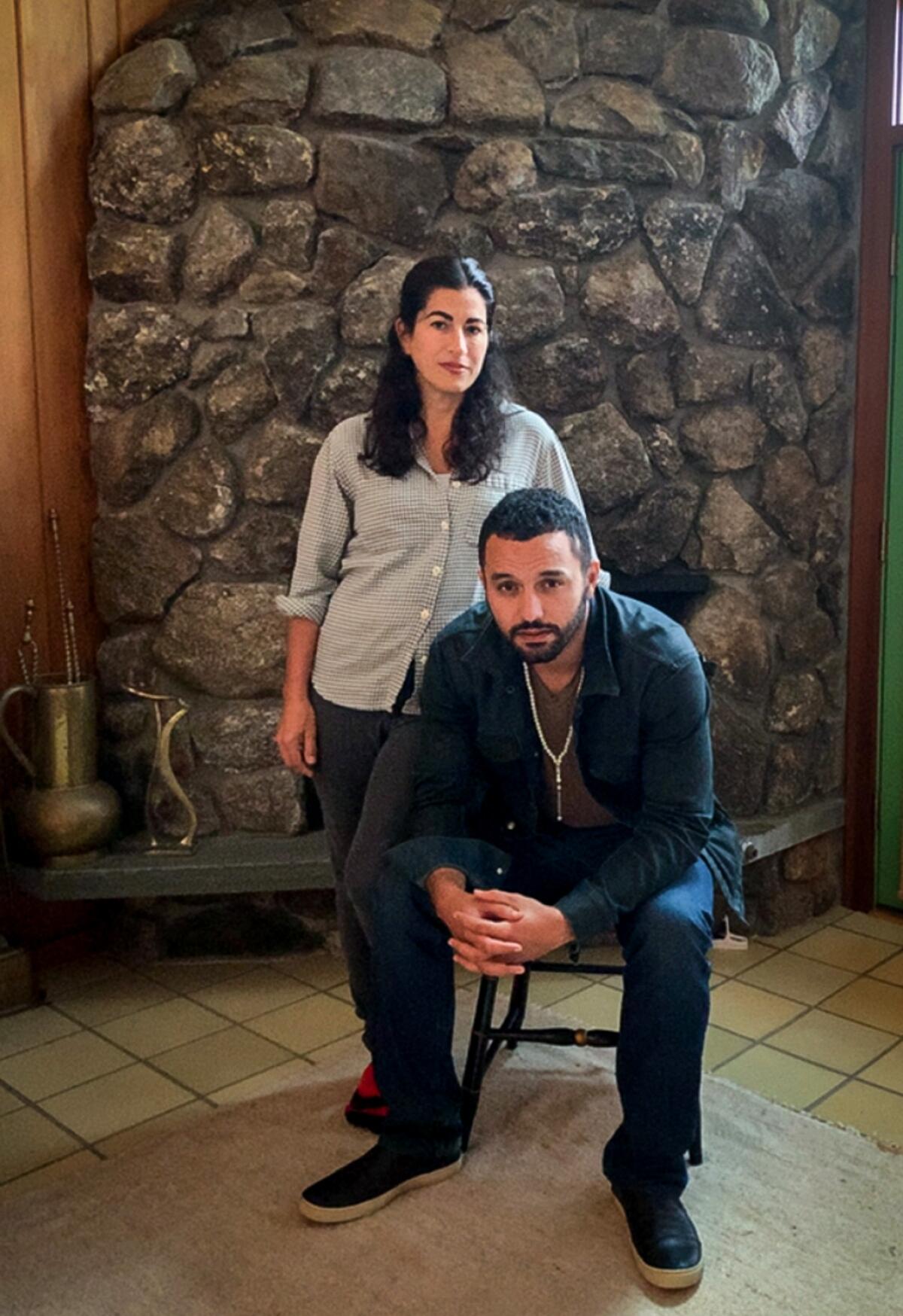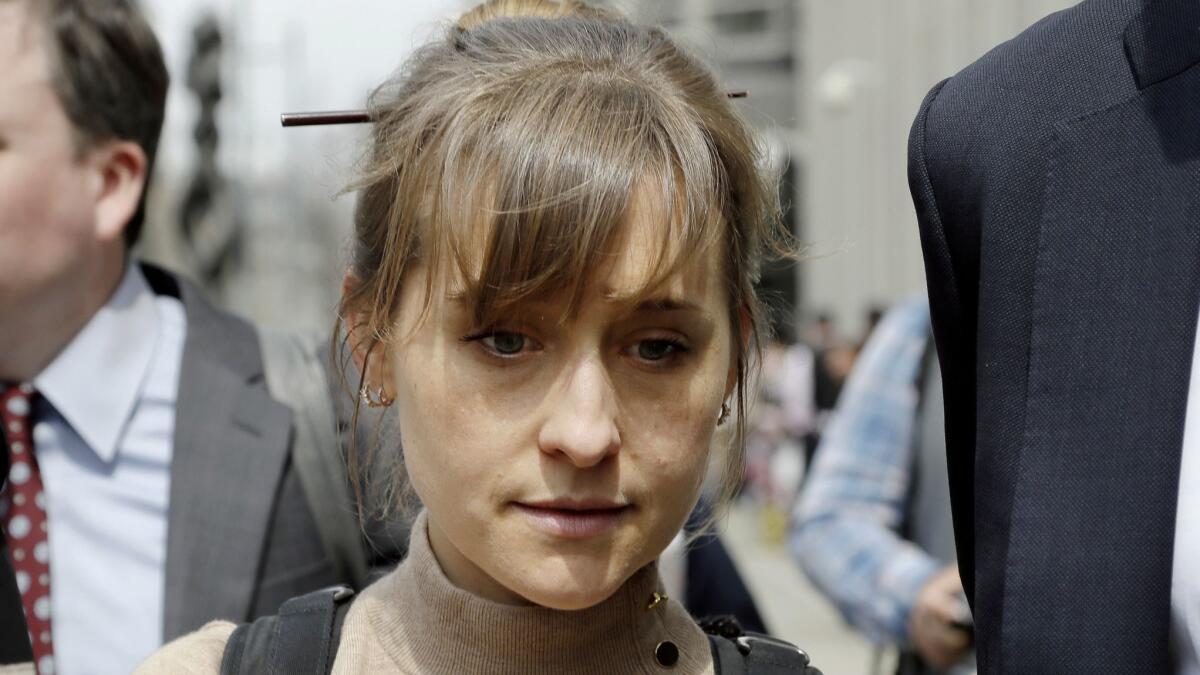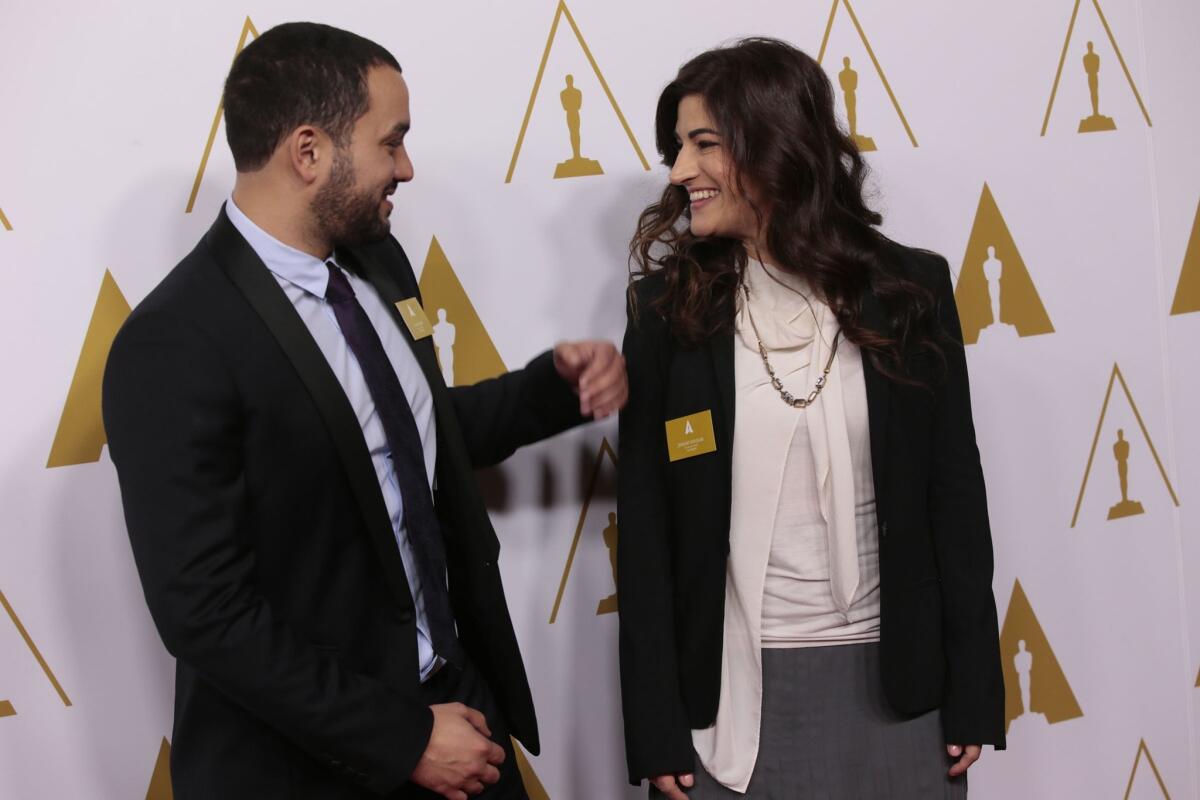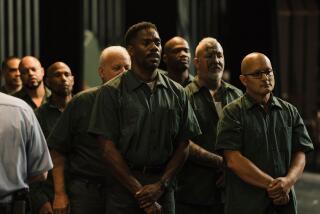‘Such depth of love’: Directors of ‘The Vow’ want you to know NXIVM was not just a ‘sex cult’

Jehane Noujaim understands better than most why so many intelligent, accomplished people were drawn to NXIVM, the self-help group, multi-level marketing company and supposed “sex cult” whose leader, Keith Raniere, was convicted last year of sex trafficking.
She was one of them.
Before she and Karim Amer directed the HBO documentary series “The Vow,” which chronicles the rise and fall of the group, Noujaim had taken some of NXIVM’s self-improvement classes.
It began in 2007, when Noujaim — a filmmaking talent who’d directed the noteworthy documentaries “Control Room” and “Startup.com” — met Sara Bronfman, daughter of billionaire Edgar Bronfman, at a conference on Necker Island, Richard Branson’s private retreat in the Virgin Islands.
The heiress was a prominent figure within NXIVM and spoke highly of the organization’s personal development program. A few years later at the Cannes Film Festival, Noujaim befriended Mark Vicente, co-director of the hit spiritual documentary “What the Bleep Do We Know?” and also a high-ranking member. “Here was another successful, thoughtful person who was telling me about NXIVM,” Noujaim recalled recently by phone in a joint interview with Amer, her husband and collaborator.
In 2010, she decided to travel to Albany, N.Y. — the group’s home base — to take a five-day seminar. She ignored the warnings of a loved one who believed that NXIVM was a cult; Noujaim was interested in what the group had to offer.
Docuseries like “The Last Dance” and “Tiger King” are a hit with viewers and critics, but the Primetime Emmys haven’t caught up to the zeitgeist.
She ended up having to leave early, for work obligations, before completing the course. Soon after, she met Amer and the two set to work on a documentary called “The Square,” about the Egyptian revolution; they also got married and had three children — including twins — within two years.
“I did a pretty crazy thing,” Noujaim says of this intense and chaotic period in her life. “There was a lot of pain associated with being up all night and trying to have a career.” So in 2017, with encouragement from Vicente, she decided to finish her NXIVM course in Los Angeles. But when Vicente failed to show up at the party she threw to celebrate completion of the program, she knew something was amiss.
As she later learned, Vicente and his wife, Bonnie Piesse — an actress who’d appeared in “Star Wars: Attack of the Clones” and “Revenge of the Sith” and who was also committed to NXVIM — were beginning to make startling discoveries about the organization.
Among the revelations: Some of Raniere’s most devoted followers had formed a secret society, known as DOS, in which women were branded, coerced into sexual slavery and put on highly restrictive diets.
The filmmakers followed Vicente, Piesse and survivor Sarah Edmondson over the next few years as they extricated themselves from NXIVM and decided to speak out publicly against Raniere and his inner circle, including “Smallville” actress Allison Mack, allegedly one of his chief recruiters.
Including extensive archival video and audio recordings, “The Vow” delves into NXIVM’s curious, almost corny rituals — including color-coded sashes worn to indicate one’s rank within the organization and late-night volleyball games where Raniere, called “Vanguard” by his followers, would expound on his philosophies between matches.
But the nine-part docuseries also offers a sympathetic portrait of the spiritual seekers who were duped by the alleged con man. And, as Amer and Noujaim say, that was a key part of their mission.
So you understood the appeal this group held to many people?
Jehane Noujaim: I did understand the appeal of the group. That’s not to say that I didn’t have some questions about the sashes. Sometimes I left my sash on the chair to perhaps show my defiance. But I was more interested in the discussion groups and asking these deep questions. By the time the organization was crumbling, 18,000 people had taken these classes. We’re talking about successful actors and doctors and lawyers.
Everyone at the end of the day has the same basic questions: “What’s my purpose? Do I feel like I belong to a community? Do I want to be a bigger part of a community? Am I a good person?” Many people ask [these questions] at the family dinner table and some people ask them in their religious groups. But when you don’t have that, I think a community like this can be very welcoming and rewarding for people.

A lot of people in “The Vow” were filmmakers or actors. Is there something particular about NXIVM that appealed to creative people?
Noujaim: I asked myself that a lot. When you’re a filmmaker or when you’re an actor, you’re only as good as your last acting role, or you’re only good as the last film you made. There’s no tried and true path to success.
Karim Amer: I think what was attractive to a lot of people about the framework of NXIVM and ESP [“Executive Success Program,” the name of the seminars run by NXIVM] was this idea of measurable results — that you could take areas of your life like self esteem and pain and joy and put them into a system that you could understand a lot more and have more of a scientific approach. I think that is particularly appealing to artists and creatives, because in many ways, every creative wants to channel that spark, your creative voice, whatever you call it. But what if there was a way to actually harness it, actually be able to be in control of it like you would a horse, as opposed to it being like this random gust that comes every once in a while.
People who dare to dream, who dare to seek, should not be cast away as if something’s wrong with them. I think it’s quite the opposite. I think when we cast them away, it says more about us than it does them. A lot of times things go off the rails. The act of seeking in itself shouldn’t be seen as a horrible thing even when it has bad consequences.
The series includes archival footage and audio recordings from former members of NXIVM. How did you manage to get access to all that material?
Noujaim: Everyone [in NXIVM] was encouraged to film and record things, because people felt they were there as a learning experience and that Keith had very important things to say at all times that should be documented.They recorded all their conversations with him and with each other.
[The people] that gave footage to us trusted that we would tell a story with empathy and compassion. The way the story was presenting across the headlines was that of simply a sex cult, but as you see in the film, the people that were drawn to the organization were certainly not drawn to a sex cult. They were drawn to what they saw as an ethical organization.
One of the things we see in the series is people struggling to separate what was valuable about the organization from all the alleged abuse. Was there anything you took from it that you found valuable?
Noujaim: There’s an exercise where you’re asked to write about a person that you dislike or that you feel has thwarted you in some way. By the end of this exercise, you are truly standing in that person’s shoes and having empathy for that person. What I would like to say to all the people that are a part of NXIVM now that have questions: This series will allow them, like that exercise did, to step into the shoes of people who they feel are destroying their lives, like Mark and Sarah. I think exercises like that are extremely valuable, especially given the world we’re living in right now, where it’s very important we have radical empathy towards each other.
Once Mark Vicente told you about what was happening with NXIVM, did you know immediately that you wanted to make a documentary? How did the project develop from there?
Noujaim: It was about a crisis of faith. It was about how this most important relationship was falling apart for both Bonnie and Mark. They were questioning everything. It was a process of following them as they went through it. They asked themselves many times whether they should go public, if they were right. It wasn’t very clear.
I just tried to use the fly-on-the-wall style that I learned from D.A. Pennebaker and Chris Hegedus. I learned from them there is a great value to trying to be a part of the furniture and just being with your characters as they are going through something.
I felt like in this world, where there was a battle of narratives and a questioning of self, I felt like it would be extremely valuable to have a camera there recording. It wasn’t until more information started to come out about what was happening that it started to become more of a film.
Amer: What we aspired to do in this project was to show what people in high-control groups can show us about the depth of human relationships. They have such deep relationships with each other, there is such depth of love and pain. It is, at its core, a betrayal story. And to understand the betrayal, you have to understand the depth of love they felt.
Noujaim: I remember when Mark first said, “I would have died for this guy [Raniere].” You look at political parties, groups in the Middle East, groups that would sacrifice their lives for an idea. I think that having an understanding of how powerful that idea is for a human being is very important.

This is a complicated story to tell, both logistically and emotionally. What was the biggest challenge for you in making the series?
Noujaim: The priority was to humanize the story, to take a story that is sensationalized across the headlines, and to put nuance and a human face to it. I think the most difficult part has been watching the pain of people on all sides of this who believed in goodness, who dared to dream, dared to think they could change their lives, to see the pain they feel in being associated with what has been purely relegated to a sex cult rather than this much more complex story.
It was very personal and difficult, because I did have dear friends on both sides of this. I believe it’s the job of the filmmaker to create the space for debate and allow these different sides to be understood.
‘The Vow’
Where: HBO
When: 10 p.m. Sunday
Rating: TV-MA (may be unsuitable for children under age 17)
More to Read
The complete guide to home viewing
Get Screen Gab for everything about the TV shows and streaming movies everyone’s talking about.
You may occasionally receive promotional content from the Los Angeles Times.






